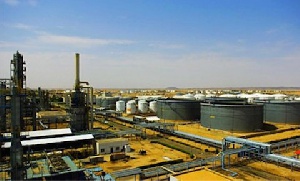The decision by the Bulk Oil Storage and Transport Company Limited (BOST) to compete with the private sector in the downstream petroleum products distribution sector has resulted in huge losses for the state-owned company.
It has emerged that between January and September 2016, BOST made GH¢32million (GH¢32,017,779) loss from its trading business.
The revelation was contained in the management accounts of BOST covering January to September 30, 2016 sighted by The Finder.
Under current Managing Director (MD), Mr Kingsley Kwame Awuah-Darko, BOST, a strategic reserve holder, last year joined the downstream petroleum industry by competing with the private sector companies in the distribution of finished petroleum products.
Expectation that joining the downstream business will make BOST profitable turned sour as trading losses have negatively affected the overall profitability of the company.
Mr Awuah-Darko said BOST gained a half-year profit of US$21million for 2015 and, therefore, the current loss position of the company raises serious questions.
When The Finder contacted Mr Awuah-Darko on factors responsible for the loss, he advised this Reporter to ensure that the document he was relying on for this story was authentic, adding that he did not know the source of this information.
He, however, agreed to grant an interview tomorrow (Wednesday) morning saying he was currently engaged with transition work.
Some analyst say BOST should immediately scrap the fuel trading business and focus on its core mandate of providing the backbone infrastructure for the downstream petroleum sector while serving as the strategic stock holder.
According to them, this is necessary to ensure that BOST does not also join state-owned institutions that have accrued legacy debts which Ghanaians will be taxed to pay.
If the losses incurred by BOST were incurred by private sector companies, Ghanaians will not be taxed to pay for the loss.
They argue that with an efficient and well managed backbone infrastructure, the private sector would deliver finished petroleum products to all corners of the nation and neighboring countries.
BOST’s entry into the downstream petroleum products distribution sector has led to the collapse of several Bulk Oil Distribution Companies (BDCs).
The goal of supply chain is to provide maximum customer service and satisfaction at the lowest cost possible.
Currently, BOST has a network of storage and pipeline infrastructure strategically located across the country.
These are: Accra Plains, Mami-Water, Akosombo, Kumasi, Buipe and Bolgatanga Depots.
Ghana’s petroleum industry, though relatively young, has been touted as having the potential to moving the country from a developing country to a developed one.
The growth of the industry is highly dependent on ensuring that petroleum products produced at the downstream sector of the industry are distributed consistently and timely to consumers through an effective and efficient supply chain system.
Though this is the ideal situation yearned for by stakeholders, the sector is plagued with challenges that negatively impacts on performance.
Business News of Tuesday, 20 December 2016
Source: thefinderonline.com













